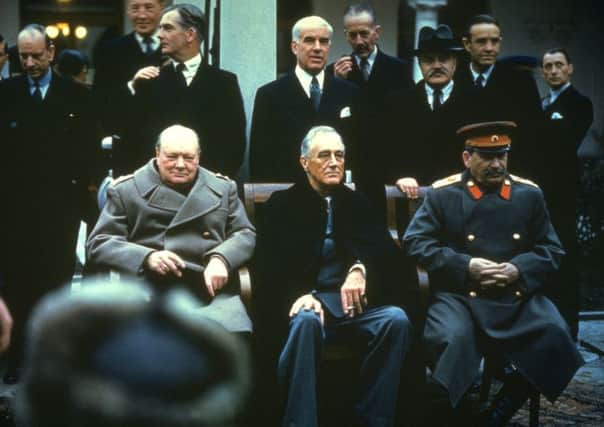Why Boris Johnson is no Winston Churchill – Alastair Stewart


Comedian Don Rickles once said of Robert de Niro: “To know him is a treat, he’s one of the great actors of our time – you ask him, he’ll tell you!”
Boris Johnson’s 2015 book ‘The Churchill Factor’ is really a personal rebuke to Ian Dale’s ‘Prime Minister Boris... and other things that never happened’. When Johnson describes Churchill as an eccentric “thorough-going genius” whose enemies “detected in him a titanic egotism” and decried him as an “unprincipled opportunist”, there’s little doubt who he’s also thinking about.
Advertisement
Hide AdAdvertisement
Hide AdChurchill scholars labour enough under the cultism that shrouds the man and Johnson has only jumped on the bandwagon. Churchill’s pugilistic style and a lifetime of witticisms and anecdotal tales make him a titan of liberty or a tyrant of imperial hubris. For decades American presidents have been the worst for seeing 1940-42 as the definition of solid, go it alone, ‘hell yeah’ mentality.
Churchill’s humour was mischievous, but he never made a career out of it. Johnson as a writer has nothing on the man who won the 1953 Nobel Prize in Literature. For years, Johnson was the butt of Have I Got News For You jokes. Churchill is a well-regarded historian, albeit with a penchant for writing himself into the action (often because he was at the heart of it, anyway).
Johnson also lacks the same historical scale as Churchill, who was amassed millions of words as a journalist and produced seminal works including a sweeping history of WW2. Johnson exaggerated his news stories from Brussels as a young reporter and yet mused on whether Turkey should join the European Union in his ‘Dream of Rome’ documentary. Churchill was a meticulously prepared orator with a theatrical sense of occasion who famously conducted policy at a grand dining table. A romantic, he orchestrated the Grand Alliance, navigated the competing pulls of the US and Europe and never forgot Britain’s national interest, all while cementing national spirit.
‘I am a glow-worm’
Throughout his life, Churchill was a brazen self. Both men, if anything, share a penchant for getting in the way. In the Sidney Street siege of 1911 as Home Secretary, Churchill wanted to be on camera and in his youth, he ran towards the sound of battle from Cuba to India to South Africa in his youth. With eerie prescience, he declared: “I shall save London and the Empire from disaster.” He was 17.
The idea that Johnson’s career path follows a man who was at MP at 25 and Chancellor of the Exchequer by 50 (with numerous senior appointments in between) is just inaccurate. “We are all worms,” said Churchill, “but I do believe that I am a glow-worm” – and he wasn’t wrong.
Johnson hasn’t displayed any of the same manifest destiny that Churchill felt in his bones. The EU is not Nazi Germany on the march in 1940. Churchill, despite leading Britain at war, never surrendered his democratic principles. Parliament held secret sessions on the most sensitive matters of the war effort, and he even survived a vote of no confidence in 1942. Johnson was in power for a week and tried to prorogue parliament to get his way. Churchill presided over Britain’s last wartime coalition. Any suggestion that Johnson is like a Churchill at war implies we’re fighting an enemy. If you reject that hyperbole, then you’re comparing two peacetime prime ministers and Churchill’s second term (1950-55) was an unsuccessful push-back against Britain’s diminished role in the world.
Churchill chased danger. He fought on the Western Front in 1915 and regularly stood above the 10 Downing Street annexe watching air raids. By 1943, he had travelled 111,000 miles and spent 339 hours in the air. If not for an intervention by King, he would have landed with the troops on the D-Day invasion in 1944.
All of which is to say everything and nothing about their character. Johnson has come under pressure to confirm how many children he has. Churchill was married for 60 years (with no definitive evidence he ever strayed). Churchill was a short-tempered nuisance but didn’t discuss having a journalist assaulted. When you open the door on the virtues, the vices must be measured too.
Advertisement
Hide AdAdvertisement
Hide AdOf his war years, Churchill said that it was Britain that had the “lion’s heart” but he “had the luck to be called upon to give the roar”. Johnson’s book might be wishful comparison, but none of his actions as prime minister suggestshe will, or even genuinely wants to, emulate Sir Winston.
Alastair Stewart is a freelance writer and public affairs consultant. He regularly writes about politics and history with a particular interest in nationalism, and the life of Sir Winston Churchill. Read more from Alastair at www.agjstewart.com and follow him on Twitter @agjstewart